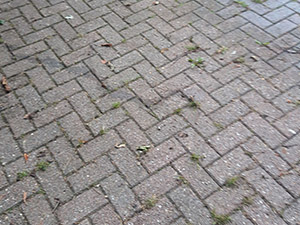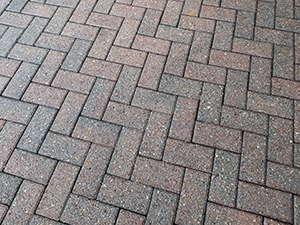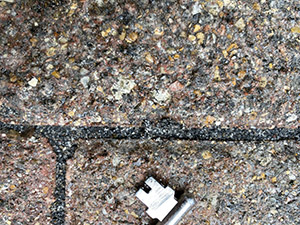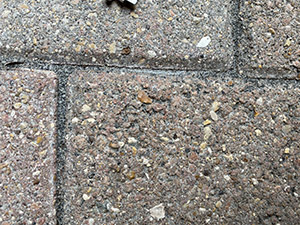Block Paving Jointing Sand - Online Shop
Areas of concrete Block Paving that are almost 'Butt-Jointed' and / or have very narrow joints, typically less than 2mm, are not normally filled with a paving joint mortar or paving grouting product as such. This is basically because this is impractical to achieve, and any mortar will have very limited performance at these dimensions. The nature of this kind of paving generally means that this is also unnecessary, as it is laid for use on large areas over consolidated sand or stone, where it is designed to be a so-called 'flexible pavement' that is also free draining in support of ground water protection and flood protection etc. In addition to domestic driveways and the like which typically use 50mm thick coloured concrete blocks, one of the main applications of this type of commercial block paving today, usually with min. 80mm thick blocks, is for the many larger areas used for supermarket and other retail car parks as well as other vehicle hard standing and storage areas, where this is seen as a cost effective solution that is fast to install and with minimum maintenance - usually!
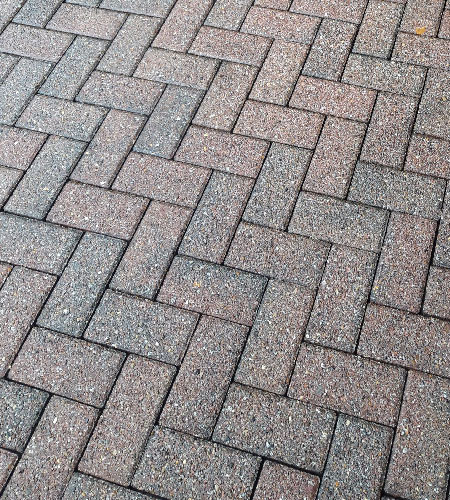
However, all these block pavements as they are sometimes known, can have relatively short-term aesthetic issues because the narrow joints between the pavers tend to fill with whatever dirt and grime occurs on the surfacing, then over time, and often surprisingly quickly, the first windblown seeds and weeds arrive. When the weeds are left, they soon become unsightly, and with the arrival of invasive species such as bindweed, couch grass, celandine and ground elder, followed by larger fast growing shrubs such as buddleia and Japanese knotweed taking root, the paving and its substructure become damaged. At some point this has to be stopped, usually by physical removal and chemical treatments, then with regular maintenance including weed removal and frequent applications of the chemical weed killers. In order to protect the environment and ground water, the use of these is now, and quite rightly in our opinion, being increasingly frowned upon.
Therefore, right from the beginning these areas of block paving can employ a specialist Paving Jointing Sand and / or Paving Jointing Sand Stabiliser to fill these joints and prevent weed growth for as long as possible, though even the best of these will require replenishing every few years. The best we have seen is the very low dusting, polymer modified graded alluvial sand based, GftK vdw VarioSand, the ‘Best-in-Class’ of these products, developed by GftK and now widely used in Germany and mainland Europe. This advanced material will also prevent the jointing sand being washed out of the joints during normal rainfall and weathering. This is a special performance grade that is also suitable for sanding and stabilising such trafficked block paving surfaces, without an expensive toxic sealer.
You can call 01257 266 696 for FREE expert advice and assistance on your paving jointing sand project, or email us at technical@nccstreetscape.co.uk
Selecting the Right Paving Jointing Materials Technology & Product
As outlined above and on the other pages of this website, there is no universal paving jointing materials technology and no universal paving jointing product. The right paving jointing for your project depends on the key criteria and your specific requirements.
We have produced a Paving Jointing Project Checklist, which is designed to help you identify and confirm all the relevant selection criteria for each project, in terms of the type and size of area, paving, joints, the site for installation and the required exposure and performance in service, durability, cleaning regime, plus the ease of closure and ease of eventual repointing.
We have also produced the GftK Paving Jointing Product Selection Guide that you can use this with the Checklist for each project, to ensure you consider all revenant criteria and select the most appropriate paving jointing solution. Always be sure to consider ALL the key criteria and parameters for your paving project, to make the right technical and commercial decisions based on ALL the requirements.
For more advice or assistance with your specific paving project, please call 01257 266696 for FREE Expert Advice during normal office hours, or you can email us at any time to: sales@nccstreetscape.co.uk and we will get back to you just as soon as we can. Thank you.
You can call 01257 266696 for FREE expert advice and assistance on any aspect or type of paving joint mortars and pointing / grouting of paved surfaces in any way. – We are confident that we can help you to prevent or to resolve any paving joint problems or issues, saving you time and money on every single job!

